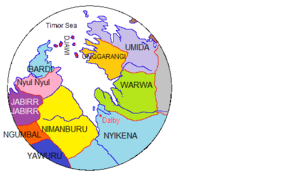Jawi people facts for kids
The Jawi people are an Aboriginal Australian group from the Kimberley coast in Western Australia. They speak the Jawi dialect. Sometimes, they are called "Bardi Jawi" because their language and culture are very similar to the Bardi people.
Contents
The Jawi Language
The Jawi language is a special dialect. It is part of the Nyulnyulan language family. This family is found in the western part of Australia. The Jawi language is very similar to the Bardi language.
How Jawi People Lived and Traded
The Jawi people were skilled traders who traveled by sea. They used special wood called mandjilal to build their catamarans. This wood came from the Unggarrangu people. In return, the Jawi shared this light mangrove wood with the Bardi. The Bardi used it to make their own log rafts.
The Jawi also traded shells. They exchanged these shells for wooden spears. These spears came from the Warwa and Njikena tribes who lived inland.
The Jawi and Bardi people have always shared many things. This includes their family systems, how their communities are set up, and their traditional laws. Because they are so close, they worked together on their native title claim.
Jawi Traditional Lands
The Jawi people's traditional lands include Sunday Island, which they call Ewenu. Their lands also cover many other islands nearby.
A researcher named Norman Tindale once estimated the Jawi lands. He thought they covered about 130 square kilometers (50 square miles). This included Sunday Island and other islands like West Roe Island and Jackson Island. However, it can be tricky to map out exact traditional lands from the past.
In 1972, the Jawi and Bardi communities came together. They established a community called One Arm Point. This community is located on the Bardi mainland.
Later, in 2005 and 2015, the Jawi and Bardi people won part of their shared native title claim. This means their traditional rights to their land were recognized.
History of Contact with Others
Jawi people started meeting non-Indigenous people more often in the 1880s. This was when pearlers came to their waters. The area was rich with pearls.
Sadly, many Jawi people died during an influenza sickness. This happened on Sunday Island in the early 1900s. Some reports say that more than two-thirds of the Jawi population passed away.
From 1905, the government took control of all Aboriginal children on Sunday Island.
The Sunday Island Mission
A mission was set up on Sunday Island in 1899 by Sydney Hadley. It was a Protestant mission. Hadley was later accused of letting traditional practices continue. He was even said to have become part of the Jawi tribe. Because of this, he was temporarily removed from his role. However, he was later allowed to return.
Hadley ran the mission until 1923. Then, he sold it to the Australian Aborigines Mission (AAM). In 1929, another group, the United Aborigines Mission (UAM), took over.
In 1934, the mission moved off Sunday Island. It went to Wotjulum on the mainland. But by 1937, the mission returned to Sunday Island.
During World War II, H. H. J. Coate took over the mission. He was also studying the Bardi language.
Philip and Dorothy Devenish joined the mission from 1952 to 1958. Philip was a carpenter. They helped build a school and worked on the mission's boat, the Orlada. They also helped with basic medical care and teaching young children. Philip admired the Jawi people's amazing knowledge. He was impressed by their skills in swimming, diving, fishing, and guiding boats through dangerous reefs.
The mission on Sunday Island closed in 1962. After this, the government decided to move all the people off the island.
Other Names for the Jawi People
- Chowie
- Djaoi
- Djau
- Djawi
- Ewanji, Ewenyoon, I:wanja
- Ewenu
- Tohau-i. (This name refers to the main island in the Buccaneer Archipelago)
- Tohawi
 | Emma Amos |
 | Edward Mitchell Bannister |
 | Larry D. Alexander |
 | Ernie Barnes |


